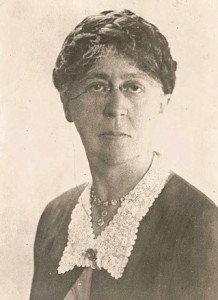Last month, my collaborative-minded web friend, John Folk-Williams, introduced us to Mary Parker Follett, in this article on his excellent blog Cross Collaborate. Among the living humans from 1868-1933, her insights reflected a brilliant mind, systems thinking, and in retrospect, are visionary. I was totally intrigued, and so I followed up…
First, I procured a copy of Mary Parker Follett: Prophet of Management from a regional library. Edited by Pauline Graham, the book is a celebration of Follett’s writings from the 1920s. The Prophet of Management label was affixed by Peter Drucker, who provides an introduction to Follett, in Graham’s book. Her work has influenced many others, and continues to be routinely discovered, and acknowledged. As I anticipated, on reading, her work has a strong resonance with me.
From this 2010 mediator’s eye, Follett’s writing on constructive conflict jumped off the page at me. Presented as part of a lecture series on the psychological foundations of business management, to the Bureau of Personnel Administration conference group, in New York, in 1925, it struck me how she thinks and describes conflict. Her words are refreshing, and her ideas very much precursor, and align with, today’s best practice thinking on conflict management.
Here’s a few of Follett’s ideas, and quotes, on “constructive conflict”:
Put conflict to work: As a conflict difference is here in this world, and we cannot avoid it, we should, I think, use it to work for us.
Friction is good: the mechanical engineer capitalizes on friction, the music of the violin we get by friction, we left the savage state when we discovered fire by friction”
Three ways: The three main ways of dealing with conflict are domination, compromise and integration… Compromise is about giving up something; it does not create, it deals with what already exists… Integration is about finding a solution in which both (party’s) desires have found a place.” (words spoken 60 years before Getting to Yes)
Conflict, invention, and new values: We should always hope to have conflict, the kind which leads to invention, to the emergence of new values.
Revaluation: One of the most important reasons for bringing the desires of each side to a place where they can be clearly examined and valued is that evaluation often leads to revaluation. We progress by a revaluation of desire.
Realignment and revaluation: Realignment of groups is connected to revaluation of interests
Whole vs. parts: Deal with business problems by breaking up wholes into parts. To break up a problem into its various parts involves the examination of symbols, the careful scrutiny of the language used to see what it really means.
Careful with whole-words: e.g., Much of what is written of the consumer is inaccurate because consumer is used as a whole-word, whereas it is quite obvious that the consumer of large wealth has different desires and motives from the consumer of small means.
Chess analogy: Anticipation of conflict does not mean necessarily the avoidance of conflict, but playing the game differently, that is you integrate the different interests without making all the moves.
Circular response: Response is always to a relation. I respond, not only to you, but to the relation between you and me. My behaviour helps create the situation to which I am responding. That implies (what we have daily to take into account) that my behaviour is helping to develop the situation to which I am responding the developing situation makes it impossible to develop a map of the future
Bullies not allowed: One should never allow ourselves to be bullied by an either/or. There is often the possibility of something better than either of two given alternatives.
Plus values: Every one of us interested in any form of constructive work is looking for the plus values of our activity.
Looking back to look ahead. Whole brain thinking from Mary Parker Follett. I think we can add the mantle of Prophet of Conflict Management too!
Any of the ideas/concepts/language from the above selections particularly appeal to you?
If you enjoyed this post, please consider leaving a comment or subscribing to my blog. Thanks, Ben.
Image source: BusinessWeek


Hi Ben,
Love your beautiful, accessible summary of Follett’s ideas, in particular including the “bullies” quote, which seems timely. I just returned from a two day gathering at Northeastern University, “Mary Parker Follett: The Boston Conversations,” a small group who met online, the Mary Parker Follett network (join: http://mpfollett.ning.com/ ). 261 members from 48 countries. A still “primitive site,” but we vowed last week to improve it. Our group included two from France; one from Montreal, two from Ottawa, and four from the USA (CA, MA, and ME). We started off with an exchange of how we “met” Follett, and most had the same response as you indicate, immediate fascination and desire to learn and share more. Were thinking of MPF: The French Conversations in France next year! Albie Davis, Thomaston, Maine (albiedavis@aol.com)
Thanks Albie. Fascinating, what you share about your group, and how you’ve come together… building a community around an amazing woman & her ideas, online, and now meeting in-person. Powerful, what you’re doing. My blog post about Follett is one of my popular blog posts, based on number of unique viewers. Goes to show what there is a thirst for, today… i.e., constructive approaches to dealing with conflict. Appreciate your comment, and good fortune with your French Conversations. 🙂
love it, quite interesting.